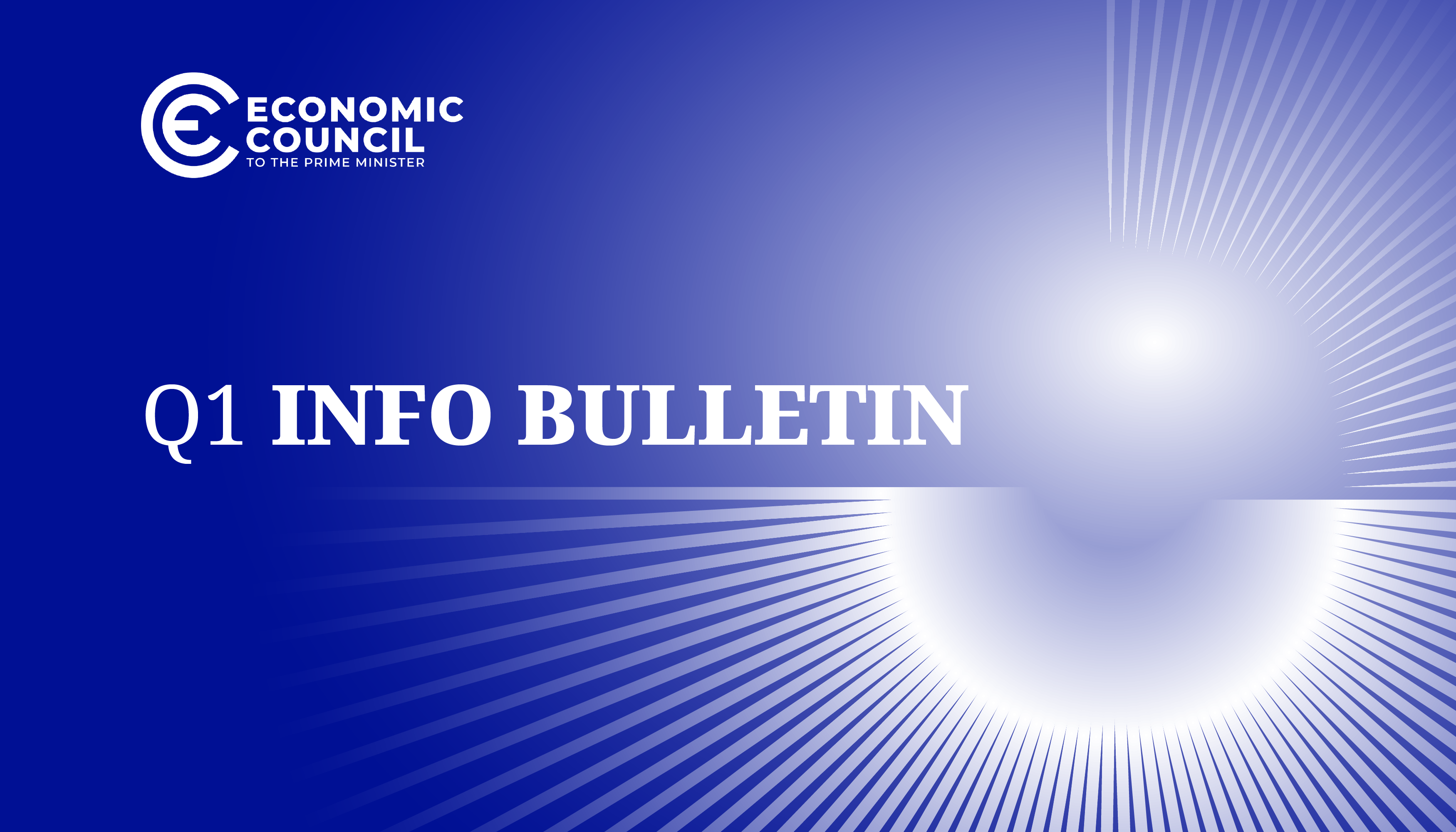

WE CELEBRATE 10 YEARS OF PUBLIC-PRIVATE DIALOGUE!
On 22 March 2024 the Economic Council to the Prime Minister of the Republic of Moldova marked 10 years of activity
At the anniversary event Mr. Dorin Recean, Prime Minister, highlighted the Economic Council's role in identifying and solving challenges in the business environment and promoting investment opportunities in the country: "For 10 years, the Economic Council has been a key partner in the dialogue between the public sector and the business community, contributing to economic growth, innovation and job creation throughout the country". The 10th anniversary of the Economic Council’s activity brought together 130 representatives of business associations, representatives of the research community, public authorities and development partners, including the Ambassador of the United Kingdom of Great Britain and Northern Ireland, Fern Horine, the Head of the Permanent Representation of the European Bank for Reconstruction and Development in the Republic of Moldova, Catarina Bjorlin Hansen.
The Economic Council is a key instrument in promoting economic reforms
This was the opinion of 96% of respondents to the Annual Survey of the members of the Economic Council (EC). According to the survey, 89% of respondents believe that the EC promotes initiatives that are in line with the interests of business associations and international best practices. The data also shows that the EC promotes reforms and initiatives that contribute to the empowerment of women in business. This is the opinion of 96% of respondents. 94% of respondents believe that the EC promotes initiatives relevant to the process of digitalization of the economy and that it ensures an effective dialogue between the state and SMEs to address the issues raised by businesses. The survey also showed that 93% of respondents believe that the business environment has improved in the areas where the EC has been active. The survey was conducted in January - February 2024 with 82 out of 145 Economic Council members.
EC Annual Report 2023
The work of the Economic Council and its Secretariat over the past decade has been described in the EC’s Anniversary Report 2023. The document shows the most important and impactful reforms promoted by the Council over the past 10 years. As well the report presents information on the issues the Council is working on and the results achieved in 2023 in such fields as business deregulation, digitalisation of the economy, transition to a green economy, women's economic empowerment and inclusive economy. The report also includes messages from all the development partners whose support has made the Council's work successful, as well as from the Heads of the Working Groups - representatives of the business community - who have expressed their appreciation for the EC’s work over the past decade.
WHAT WE MANAGED TO ACHIEVE:
71 million MDL of benefits from deregulation package no. 3.
The package included amendments to horizontal legislation related to state inspections. Among other things, the amendments expand the areas of application of the law, correct the powers of inspection bodies according to the areas of state inspection, introduce penalties against inspectors for applying measures and sanctions not expressly provided for by the law, and introduce many other provisions beneficial to business. The amendments aim to reduce the risk of sanctions for businesses and the burden of compliance in the state inspection process. Experts estimate that the package could save businesses 71 million MDL annually. The Ministry of Economic Development and Digitalization is the author of the legislative changes, with support from the EC Secretariat and the USAID/MISRA project. The package was adopted by the Parliament in the first reading on 28.03.2024.
183 million MDL of benefits from deregulation package no. 4.
On 10 January 2024, the Parliament adopted the Deregulation Package no. 4, which aims to remove a number of restrictions on business activity and reduce the regulatory burden on companies. Among other things, the document provides for the recognition in Moldova of commodity exchanges authorized in EU Member States if they prove that in their country of origin they meet the minimum requirements established by Moldovan law. It is also proposed to modernize the concept of "commodity exchange", including in relation to online trading. It is also proposed to allow public procurement through commodity exchanges under conditions set by the government. According to the same document, rural houses for tourists will not be limited to a number of rooms of only 3 and to food products coming only from the place where they are located. The deregulation package was promoted by the Ministry of Economic Development and Digitalisation with the support of the EC Secretariat and technical assistance from the United Nations Development Programme. The EC secretariat provided support in drafting the amendments, consulting stakeholders, developing supporting documents and assessing potential impacts. The package includes amendments to 12 laws and it is expected to generate annual savings of 183 million MDL for businesses.
Setting up legal and implementation framework for remote identification service (e-KYC).
By approving the Government Decision nr. 74 on creation of the eKYC platform on January 31, 2024, the regulatory and implementation framework for the creation of the remote identification of person was finalized. This is a considerable achievement in implementation of the Economic Council Initiative on Contactless Business in Moldova (remote creation and operation of a company in Moldova). With the support of the EC Secretariat, EBRD and UK-GGF, an extensive set of draft legal acts were developed and promoted, including amendments to the special legislation, 3 Government Decisions and 2 ministerial acts, as well as 3 technical concepts and terms of reference. This will pave the road for eKYC and eNotary services, as well as for a wider set of the essential public services for businesses in electronic format. Building this critical technological platform advances now to the implementation phase.
Amendments to the Law on natural gas.
The amendments were drafted with the aim of increasing the country's security of natural gas supply and establishing provisions for solving the problems that have arisen during the implementation of the current law, with a view to harmonizing national legislation with the provisions of the Energy Community acquis. The EC Secretariat assisted the Ministry of Energy (MoE) in discussing the draft law with the EC community, contributed to its improvement and monitored the process. The draft amendments to the Law on Natural Gas were adopted in the second reading at the end of December. According to the new amendments to the Law on Natural Gas, from 2025 and 2027 respectively, large and medium-sized enterprises, as defined in the Law on Small and Medium-sized Enterprises, will purchase natural gas only on the free market, at negotiated prices or on a natural gas trading platform, without the guarantee of natural gas supply at regulated prices from suppliers with public service obligations. After the publication of the Law in the Official Gazette, the MoE together with the EC Secretariat drafted an information letter on the subject and in January-February 2024 the Secretariat distributed it to all EC members with the request to circulate it to interested parties, affiliated and subordinated entities in order to familiarize gas market participants with the functioning mechanisms in advance.
Draft laws will be analyzed in terms of their impact on women and men.
On 1st April 2024, Parliament adopted legislative amendments requiring the government to assess the impact of draft legislation on gender equity and equality. This measure will contribute to strengthening the principle of gender equality in public policy-making and will align Moldovan legislation with EU best practices. As it is widely acknowledged - the problem is the insufficient participation of women in social and economic life compared to men, since women and men face unequal access to resources and services. Therefore, the analysis will be mandatory for all draft legislation that may have a significant impact on gender equity and equality and will include: Identification of direct and indirect gender discrimination generated by the provisions of the draft legislation; Identification of inequalities affecting women and men; Proposals for concrete measures to reduce inequalities and discrimination identified. The Government will develop the methodology for conducting gender impact analysis and monitor compliance with legal requirements by the authorities responsible for drafting legislation. The amendments to Law 100/2017 on normative acts were promoted by the Ministry of Justice, while the EC Secretariat came up with the proposal to consider separately the potential impact of a draft normative act on gender equality and equity.
ISSUES WE ARE STILL WORKING ON:
Regulatory mapping (of obligations and procedures prescribed by the regulatory framework) along the entire lifecycle of business activities in various sectors of the economy.
On 6 March 2024, the Prime Minister launched the work of the Regulatory Reform Working Group. The aim of the group is to develop maps of obligations and processes established by the regulatory framework for priority sectors of the economy, along the entire life cycle of business activity. This will include, inter alia, starting a business, obtaining finance, real estate and fixed assets, hiring staff, accounting and financial records, reporting, etc. Once the maps are finalized, amendments will be drafted to streamline the regulatory framework. Over the next few years, Moldova aims to become a regional leader in ease of doing business. As a measure of progress towards this goal, the ministries are expected to generate up to 5 billion lei in benefits for businesses through the streamlining exercise. This work will be carried out by the Ministry of Economic Development and Digitalization, with support from the EC Secretariat and contributions from ministries. The work is coordinated by the PM Delivery Unit.

Other initiatives to reduce excessive rules and procedures for businesses:
Developing deregulation packages no. 6 and 7.
The EC Secretariat coordinated with Deputy Prime Minister Dumitru Alaiba the list of topics to be included into the deregulation packages no. 6 (amendments to government decrees) and 7 (amendments to laws). The EC Secretariat developed summaries and analytical tables for both packages. These topics and the documents were shared and discussed with the EC members in the public meeting of the Working Group no. 1 on 25 March 2024. It was highly appreciated by the participants and experts will continue to work on their promotion, which includes development of the explanatory note, Regulatory Impact Assessment, draft legal texts and support in consultations and revisions.
State Inspections Reform.
The EC Secretariat continued the implementation of state inspections reform, in accordance with the Government Decree 108-d. Experts provided by the USAID/MISRA drafted amendments to 36 sectoral laws to primarily correct inspection domains, and develop solutions to prevent discretion and lack of proportionality in applying restrictive measures in inspection. Experts also drafted amendments to the Contraventions Code, to ensure that offenses are justified and fines are proportionate, to the extent possible and degree of participation/responsiveness of relevant ministries and inspection bodies. Finally, experts proposed amendments to the Tax Code, to align tax inspections to a number of major better regulation principles in inspection, stated in the Law on inspections. In March draft sectoral amendments were submitted for review to the State Chancellery, which agreed to further promote those. The amendments to the Contraventions Code were submitted to the Ministry of Justice to be included into a larger draft initiated by them. The amendments to the Tax Code were submitted to the Ministry of Finance to be further compiled as proposals to the budgetary and fiscal policy, which is currently being drafted.
Reform of self-employment legal framework - Business and Professional activities.
Dumitru Alaiba, Deputy Prime Minister, and Marina Morozova, Member of Parliament, requested the EC Secretariat's assistance in developing a concept for simplifying the regulatory framework for self-employed persons and professionals, in order to create the simplest and least burdensome environment, including from a tax perspective. The EC Secretariat and experts from the Ministry of Economic Development and Digitalization are involved in developing the concept and the necessary amendments. EC Secretariat experts have also participated in relevant meetings organized by MoEDD and the Parliamentary Economic Committee. The Secretariat is now finalizing the draft law, which will soon be submitted to the Deputy Prime Minister for comments. This draft proposes to regulate the activities of all categories of natural persons operating without the establishment of a legal entity.
Initiatives for digitization of businesses and remote interaction with authorities:
The draft of the new legislative package on digitalization and e-commerce was launched in public consultations.
On January 26, 2024, the Advisory Council for the Digitalization of the Economy – iCouncil held an extensive public meeting attended by over 750 people who connected to the event. The draft of the new legislative package on digitalization of the economy and e-commerce was discussed publicly and supported by the MoEDD, containing a set of 33 regulatory reform proposals. The document aims to stimulate digital innovation and implement the practice of digital nomads in Moldova to attract a new wave of digital economy activity. Also, it targets cashless economy, decentralization of the companies’ registration services, preparing ground for the eServices platforms (marketplaces) for companies, update of the fiscal requirements and taxation mechanisms of the eCommerce operations on international marketplaces. Veronica Arpintin, Secretary of State of the MoEDD, highlighted the significance of this legislative package and importance of the public-private dialogue in identifying constraints and regulatory solutions. It completes a series of actions on the digitization of the national economy that the Government committed to promote. The RIA Committee supported the initiative on 6 February and it was promoted to the State Chancellery on April 3, 2024.
eNotary platform development.
Electronic notarization is an essential service for the success of the Contactless Business in Moldova initiative, as the role of notarization of various transactions is required by Moldovan law. The EC Secretariat's greatest achievement in this regard is Law 126 (on Remote Business RM), adopted in 2023, which creates the necessary legal framework for electronic notarization, as well as for remote work. The MoJ and the Chamber of Notaries have asked the EC Secretariat and the EGov Agency to support the development of the eNotary platform. The team of experts contracted by the EC Secretariat/EBRD/UK-GGF completed the first phase of work on the concept of the system, technical requirements and a draft regulation on the use of the eNotary platform. The deliverables were submitted to the MoJ on 25 January 2024 and a series of discussions followed. The ECS will launch the process of consultations for funding the implementation stage after a formal approval of submitted documents by the MoJ.
Assessing eCommerce Legislation and support to harmonization with EU.
In support of eCommerce development in Moldova and harmonization with the EU practices and regulations, the Economic Council, with financial contribution of the USAID-MISRA project, prepared and delivered two essential assessments on transposition of the EU regulations on digital markets and digital services: DMA and DSA regulations. Both topics were intensively discussed on the EC platform with businesses and authorities, being presented publicly at the iCouncil meeting on January 26, 2024. The EC Secretariat is continuing its effort in this regard, and the next target is the support for gradual transposition of these regulations in internal legislation. USAID-MISRA project has already announced its readiness to further support this process.
Initiatives to facilitate the transition to a green economy:
Amendments to the Regulation on the conduct of tenders for offering the status of eligible producer.
The EC Secretariat supported the Ministry of Energy in consulting with the EC business community on the Regulatory Impact Analysis of the amendments to the Regulation on the conduct of tenders for the granting of the status of eligible producer. The proposed changes to the organization of tenders are aimed at stimulating investment in renewable energy sources in order to achieve national targets: the share of renewable energy sources in final energy consumption must be at least 27% in 2030. On March 26, the EC Secretariat participated and supported the Ministry of Energy in the final public consultation with the EC business community and other stakeholders on the draft amendments to the Government Decision approving the Regulation on the conduct of tenders for offering the status of eligible producer, and made some suggestions and improvements to it. The Ministry of Energy plans to submit the draft for government approval in early April 2024. At the same time, the tender documents are being prepared so that bidders will be able to submit their bids by June and the winners will be announced by December, 2024.
Program on promotion of green and circular economy for 2024-2028.
The Program Concept was presented by the Ministry of Environment on the EC platform in January 2023. The program is designed as a medium-term public policy document for the next 5 years. The EC Secretariat participated in several consultations on the document, including on the EC platform, and contributed to the process adjustment of the draft. At the end of January 2024, the Ministry of Environment submitted the revised draft for public consultation and is currently in the process of finalizing the draft and the concordance analysis of the proposals received during the consultations. It is planned to submit the draft for validation by the National Working Group for Promoting the Green Transition, of which the EC Secretariat is a member (in April-May 2024). The Secretariat will continue to participate in consultations with businesses on the draft, focusing on various sustainable business activities, including diversity of renewable energy sources, green production activities and low/no emission business.
Regulation of Sandbox in energy sector.
According to the new draft law , the Ministry of Energy will set up an individual regulatory sandbox in the energy sector, which would be a set of rules for a limited period of time, possibly limited to a specific geographical area or to specific market players or customers. Using modern market design mechanisms and digital tools, this controlled environment will serve as a dynamic platform to test and implement innovative energy solutions, effectively overcoming regulatory barriers and fostering a culture of innovation in Moldova. On March 5th, 2024, EC Secretariat participated in the third public consultation on the Sandbox Law in the energy sector. T/he objective of the meeting was to present the draft law worded taking into account the objections and proposals put forward by stakeholders, including EC Secretariat and EC members, during the consultations held in November 2023 - January 2024. The draft is to be finalized and proposed soon for Government approval.
HOW WE BUILD PUBLIC-PRIVATE DIALOGUE:
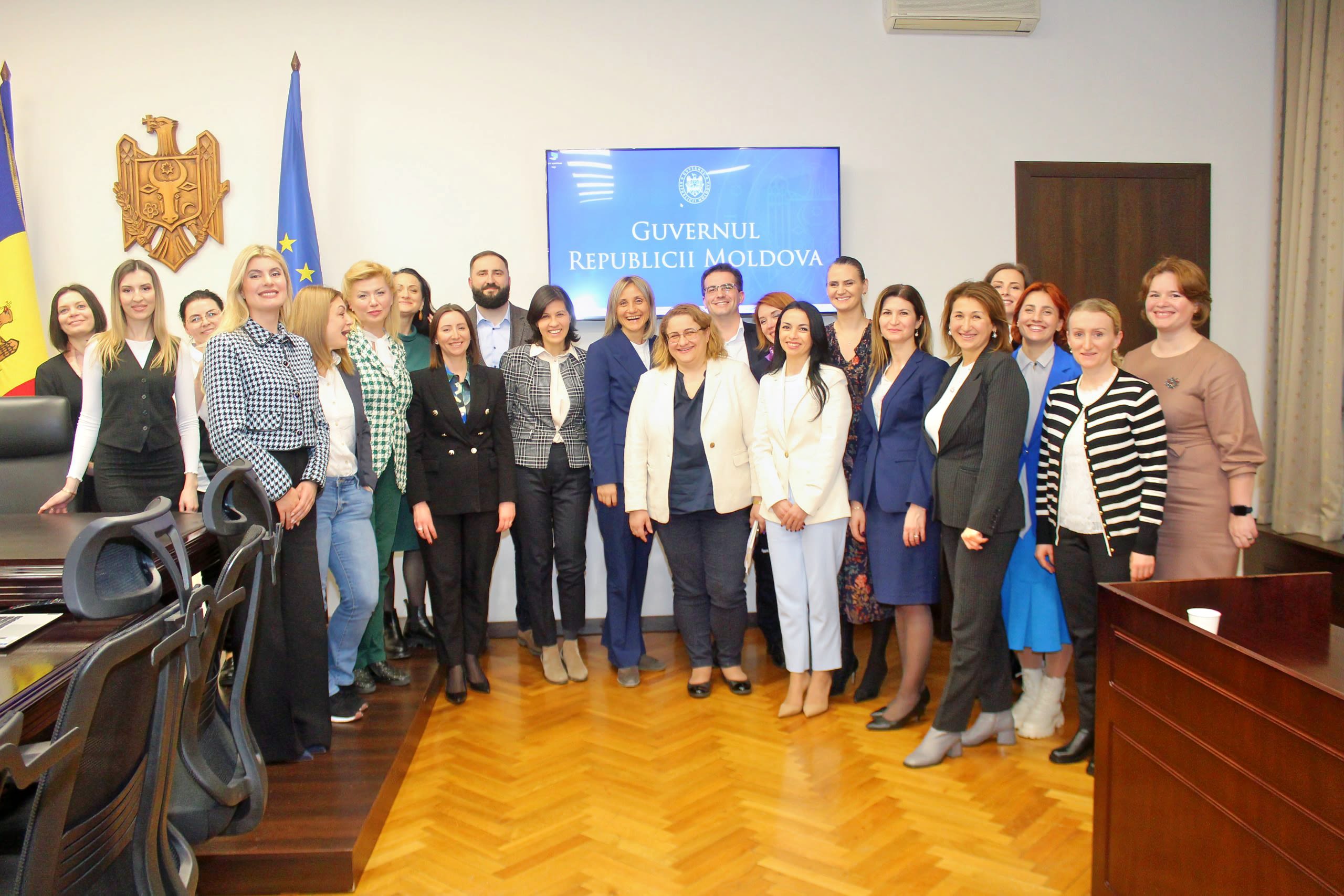
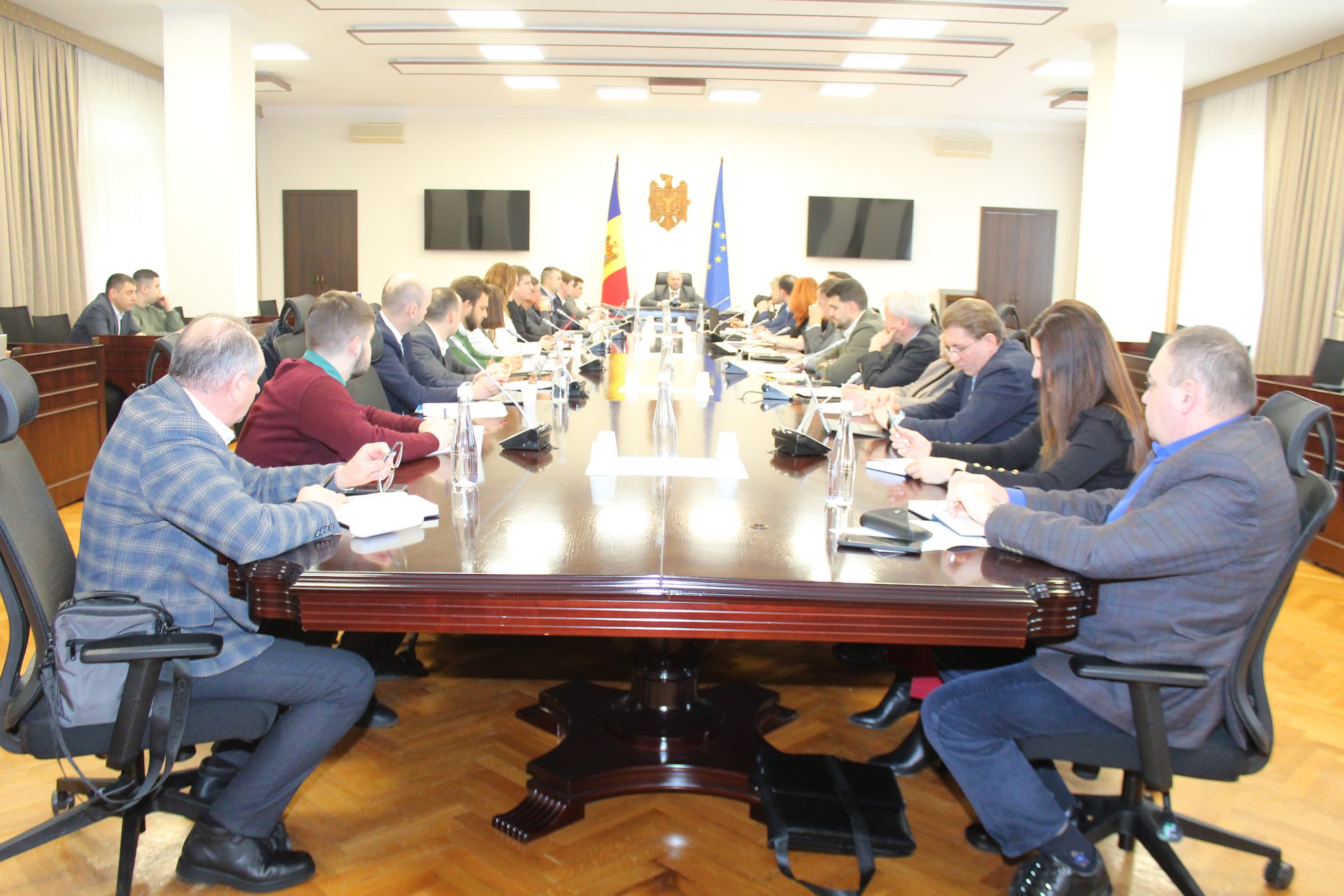
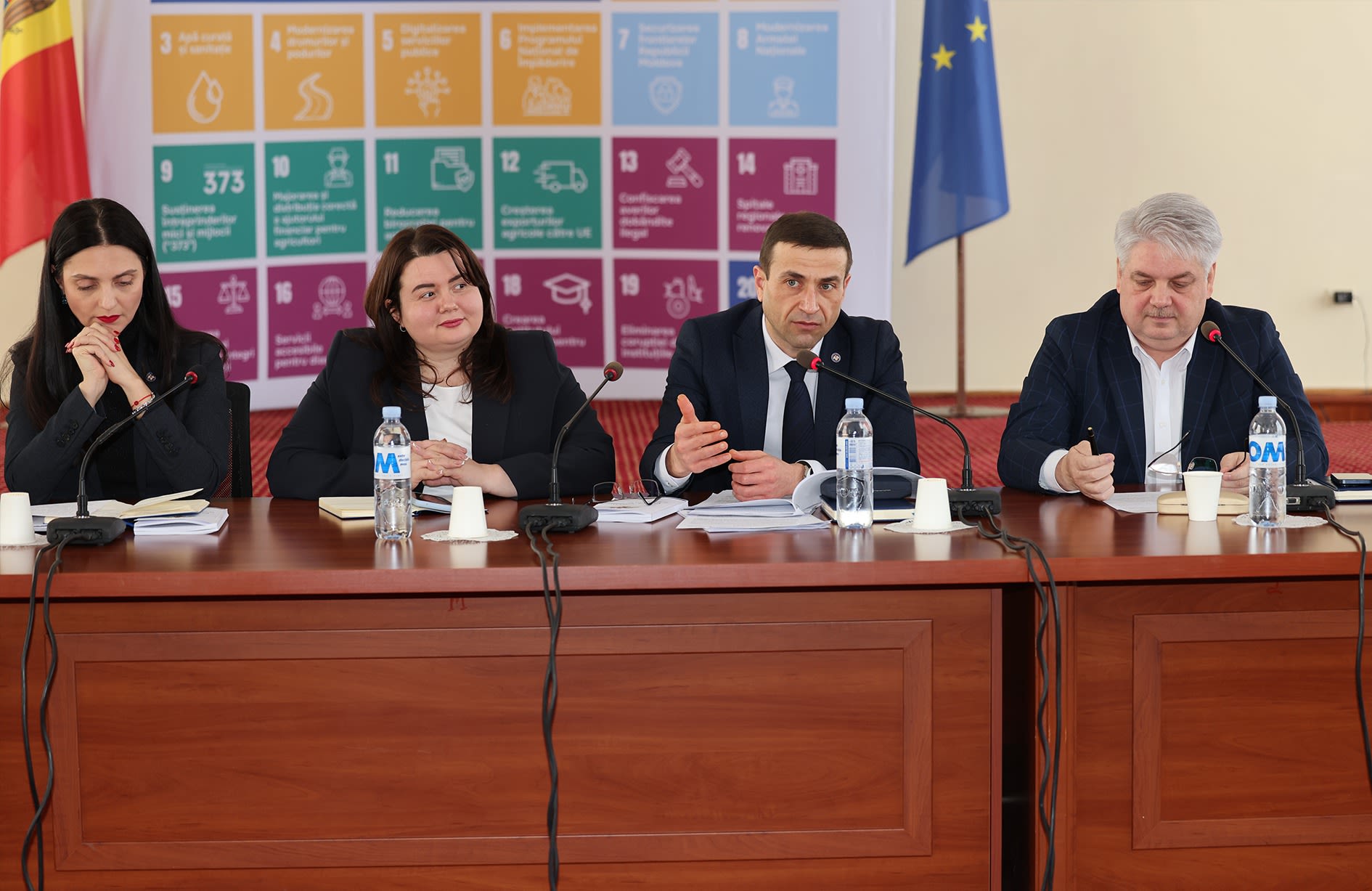
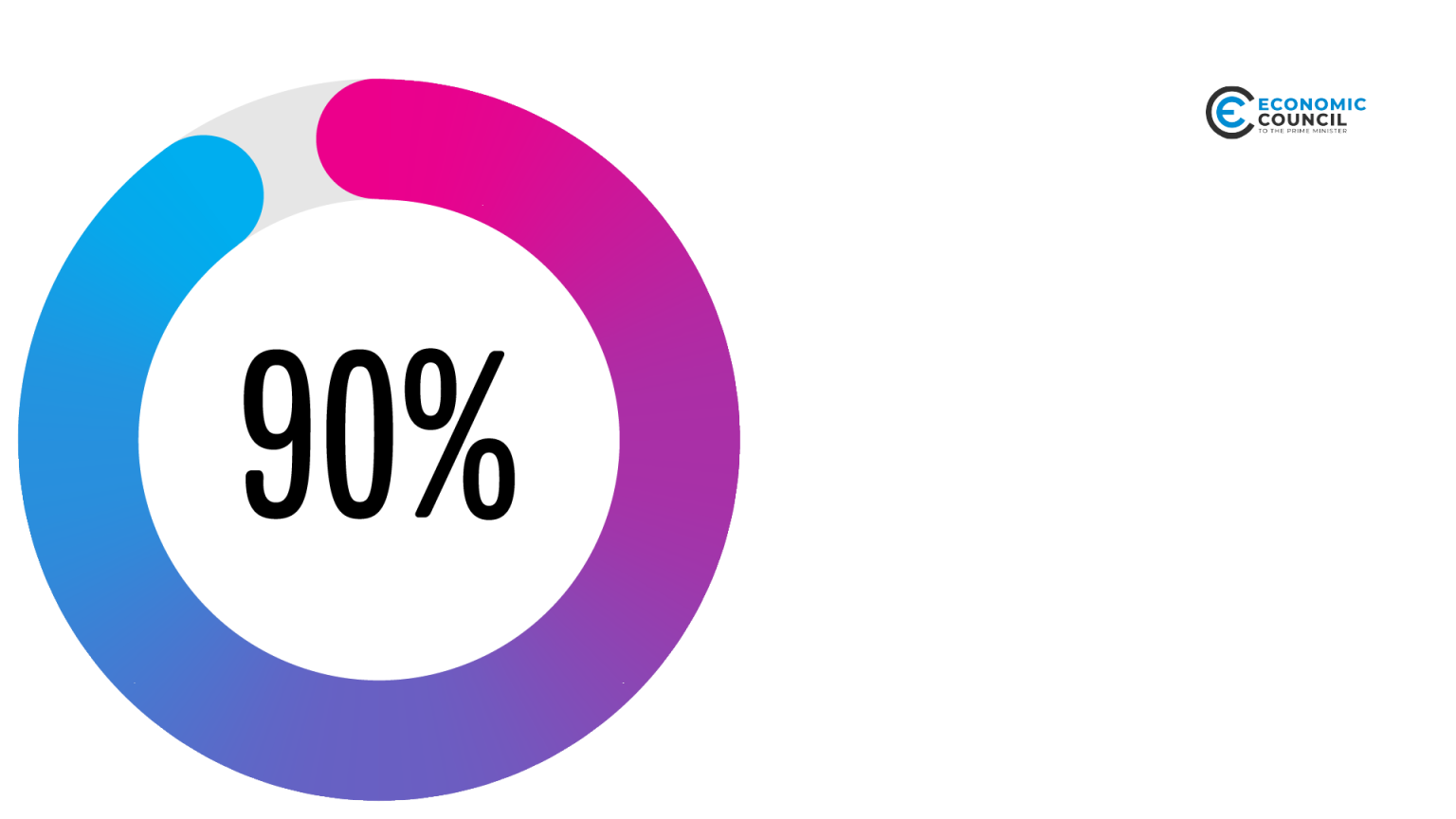
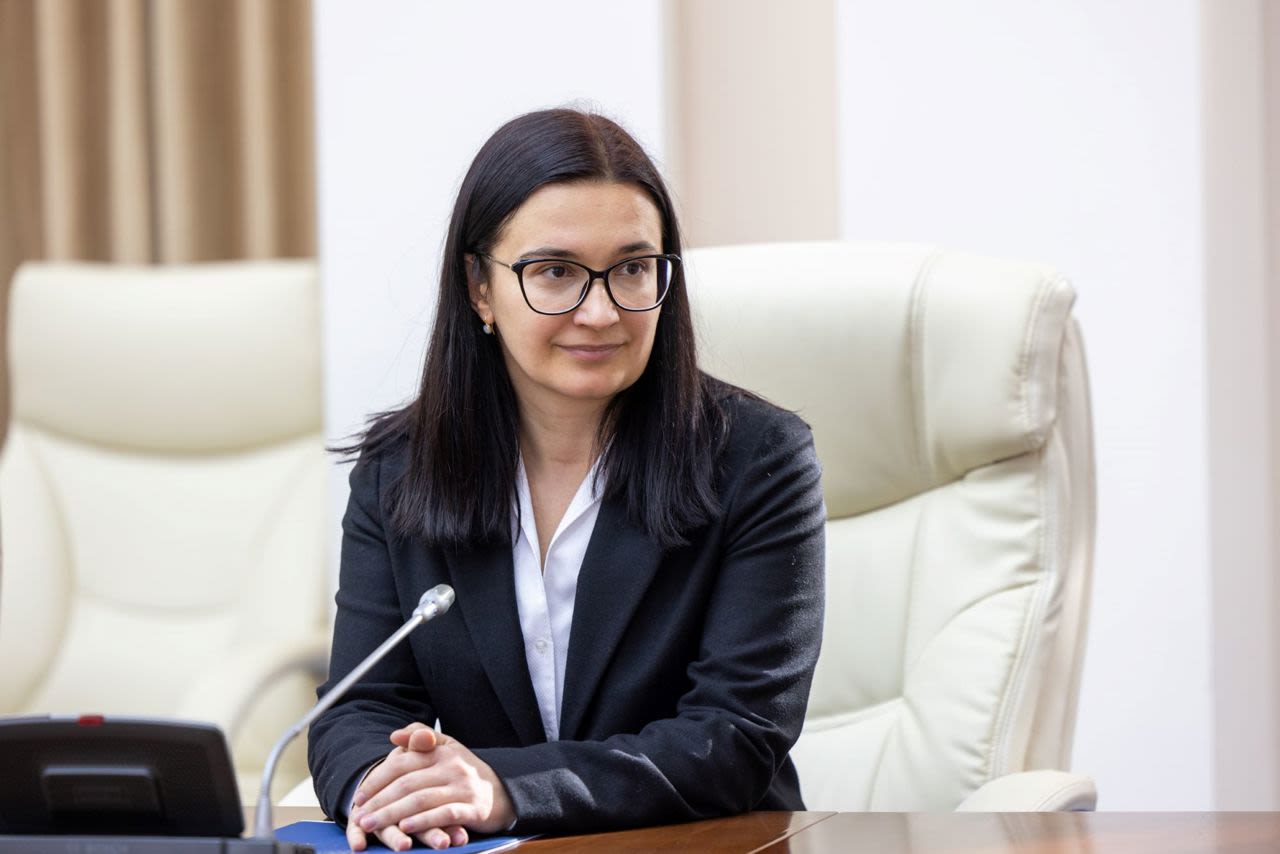
A National Council for Economic Empowerment and Gender Equality will be created.
The concept of the Council was presented on 13 February 2024 at the Working Group 'Women's Economic Empowerment and Gender Equality. Carolina Bugaian, President of the Association of Women Entrepreneurs of Moldova, stated that the Council will operate within the Economic Council to the Prime Minister and its agenda will be based on three pillars: human capital and culture, access to markets and finance, and policies. Dumitru Alaiba, Deputy Prime Minister attended the event and pledged full support for initiatives that promote women's economic empowerment. The minister stated that women's involvement in the economy not only promotes gender equality but also stimulates economic growth, reduces poverty, and fosters sustainable development. Marina Morozova, Member of the Parliament, emphasized the importance of investing in women's economic empowerment. She added that the Parliament, in collaboration with the Government, will continue to promote comprehensive policies and programs that address the challenges faced by women. After the meeting, the EC Secretariat, together with all stakeholders, will develop a Roadmap outlining the next steps to achieve the objectives of the National Council for Economic Empowerment and Gender Equality.
Oil companies request to set their own fuel prices at gas stations.
Representatives of several gas station chains are calling for an abolition of the cap on petrol prices through the application of a fixed commercial margin by the National Energy Regulatory Agency (ANRE). This practice negatively affects the economic activity of the companies. The issue was discussed , on 16 February 2024, at the meeting of the Working Group 'Stimulating and maintaining private investments' within the Economic Council. Businesses argue that the current methodology for calculating petroleum products' prices (diesel and gasoline) has made the market more complex. Some local companies have closed their gas stations, stating that the ANRE's price ceiling for gasoline and diesel does not cover their costs. The energy crisis and the war in Ukraine have led to high energy prices, increasing the cost of maintaining and operating petrol stations. Minister of Energy Victor Parlicov has consistently advocated a free petrol market. However, in times of crisis, capping petrol prices has proven to be an effective method and today the state cannot afford to abolish the cap. Minister stated that certain regulatory bodies in Moldova lack the institutional capacity to effectively monitor the market and prevent coordinated price-setting by operators. The meeting attendees argued that independent research is necessary to assess the market situation and develop proposals to address it.
National Trade Facilitation Committee.
On January 11, 2024, the EC Secretariat organized the meeting of the Customs Service jointly with the EC (as the National Trade Facilitation Committee) on the topic "Aspects of the practical application of the new Customs Code, secondary and tertiary legislation", with the aim to inform the business community about the key moments, challenges, impediments and barriers encountered, as well as to provide some practical recommendations when applying the provisions of the new Customs Code, which entered into force on January 1, 2024. The Customs Service answered dozens of questions from the business community and specialists from the Customs Service provided detailed explanations of the new customs procedures. The event was attended by the Ministry of Finance, representatives of public authorities and the business community. The Customs Service appreciated the increased interest from the business community and thanked the Economic Council for facilitating private-public dialogue.
National Employment Agency: approx. 90% of Moldovan companies expect their sales in 2024 to remain at least stable
While, 22% of Moldovan companies expect an increase in demand for goods or services, hoping for an improvement in the economic situation, the end of the war in Ukraine and the restoration of supply chains. However, 69% believe that the demand for goods and services will remain stable. This is shown by the Labor Market Forecast for 2024 from the Employers' Perspective and the Barometer of Employment Opportunities (BOA), developed by the National Employment Agency (ANOFM) and made public on March 13, 2024 at the Economic Council’s WG6 “On Labour market”. The Forecast for 2024 also shows that about 37% of interviewed employers plan to invest in 2024, with the majority investing in equipment, technologies and machinery. 10% will invest in the creation of new jobs, which will lead to an increase in the volume of goods or services from 5 to 30%. The study was conducted by ANOFM, on a sample of 2873 employers with more than 5 employees.
Meeting with Deputy Prime Minister Cristina Gherasimov on the coordination mechanism of the accession process of the RM to the EU.
On 7 March, at the invitation of the Cristina Gherasimov, Deputy PM for European Integration and Chief Negotiator for the integration of the RM into the EU, EC Secretariat experts attended a meeting to discuss the process of EU integration and the role of the EC in the coordination mechanism for the RM accession to the EU, including generation of impact and cost/benefit analyses of harmonization initiatives to the EU acquis. The issue of involving EC Secretariat and EC members into this process was addressed. It was agreed to organize a meeting on the platform of the EC WG5 “Increasing Moldova’s competitiveness in the context of EU accession” in April 2024, with the participation of the DPM and the Head of the European Integration Office.
WE ARE EXPANDING:
The Economic Council Secretariat has hired 2 new experts. Cristina Tiscul, the gender expert contracted by the EC Secretariat with the support of the EBRD, will enhance the Economic Council's activities related to women's economic empowerment. She will also coordinate the drafting of a new Roadmap that reflects the necessary steps to achieve the objectives of the National Council for Economic Empowerment and Gender Equality.
Cristina Gorea was contracted to build the BizRadar virtual community. She joined the EC Secretariat team with the support of the WB's MSME Competitiveness Project. The BizRadar App, developed by the EC Secretariat, has four modules: news on regulatory initiatives, fast online surveys, ranking public institutions, and reporting misuse of power. Currently, the application has 1427 users.

The Economic Council to the Prime Minister has new members
Dorin Recean, Prime Minister of the Republic of Moldova has signed a decree accepting three new organizations as members of the Economic Council. These are the Embassy of Romania in the Republic of Moldova, the Embassy of the Federal Republic of Germany in the Republic of Moldova and the Association of Packaging Producers and Importers from Moldova. The Economic Council has now 145 members and continues to be a platform for debates that ensures dialogue and cooperation between public authorities, the business community, development partners and the scientific community. This year the platform marks 10 years of activity, during which time it has provided solutions and expertise to over 200 topics and initiatives to which EC members have contributed.
See the previous info bulletin (Q4/2023).

Contact Us:
Phone 022-250-373
E-mail consecon@gov.md
Office Chişinău, Piaţa Marii Adunări Naţionale, 1
consecon.gov.md











